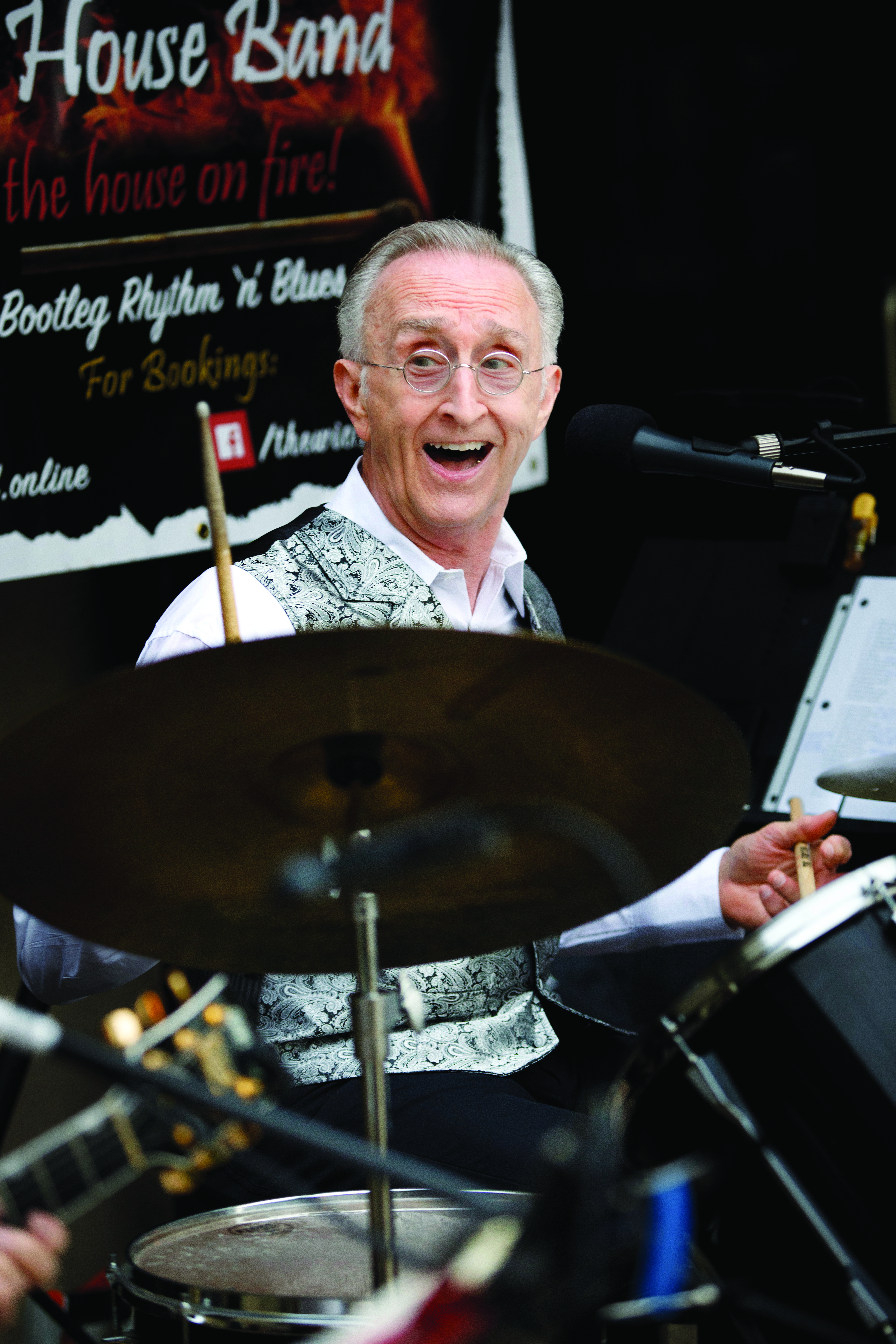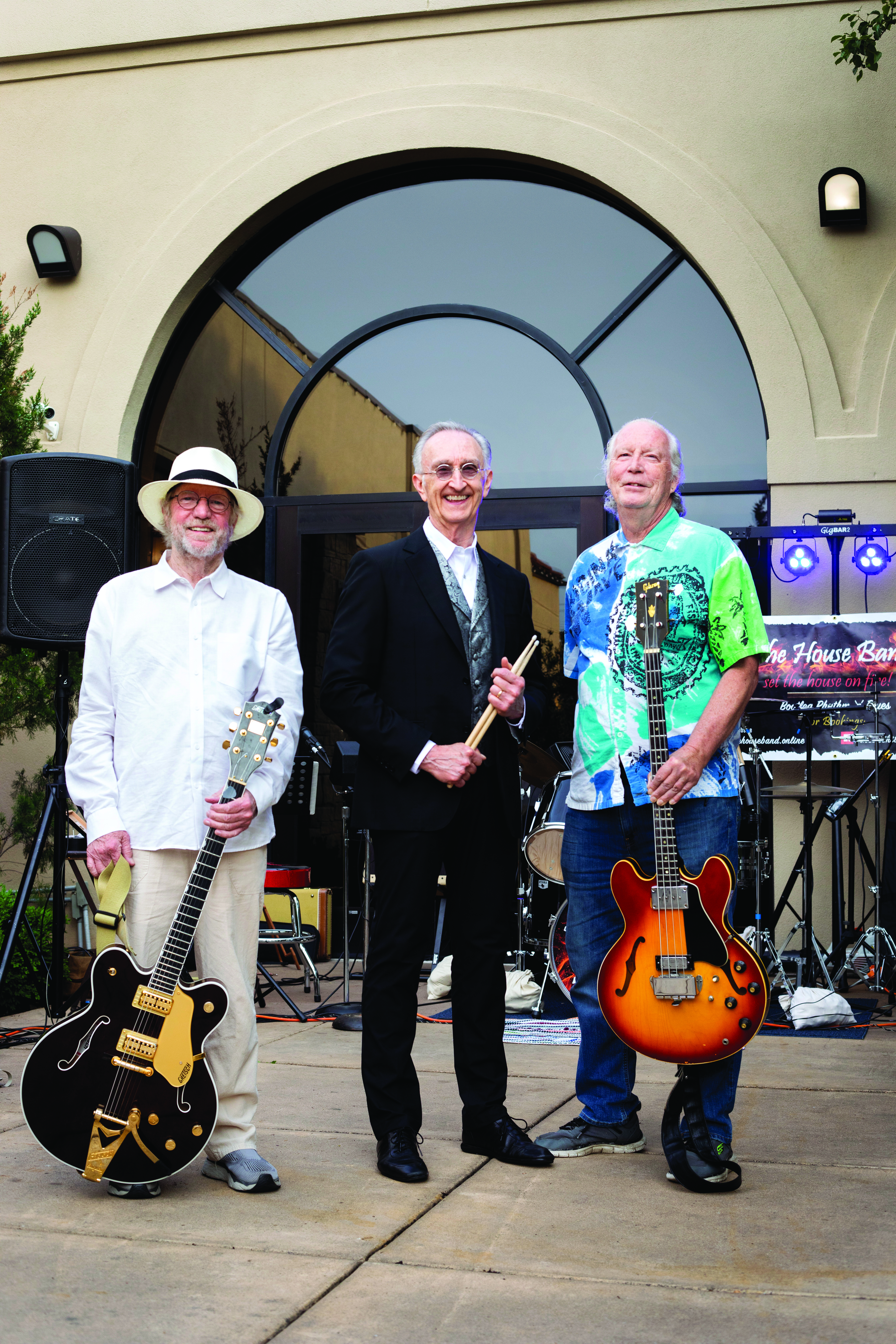Septuagenarian lawyer can beat both his clients' criminal charges and a drum set

Dan Monnat
There are generally two reasons why people go to see Dan Monnat: They’re facing criminal charges or they enjoy live music.
Monnat, co-founder and president of Monnat & Spurrier Chartered, a five-lawyer firm in Wichita, Kansas, is both an accomplished criminal defense lawyer and a musician who sings and plays drums for an R&B group called The House Band.
Across his 47-year career, Monnat has achieved courtroom victories in cases ranging from murder to money laundering. But initially, he was a musician. He played his first paid gigs at 14 and co-founded a Beatles-inspired band called The Lion’s Mane. In 1970, he moved to San Francisco, where he performed at nightclubs and venues like the infamous Condor Club, which introduced America to topless go-go dancing.
As a newly minted lawyer, however, Monnat decided to lay down his sticks and focus on building his practice. He returned to playing for a while, but by 2020, he’d been mostly out of the music scene for more than a decade. That’s when he and two of his musician friends—a guitarist and a bassist—decided to form a new band. They hadn’t even settled on a name yet when the pandemic hit. Undeterred, they found a safe way to practice together and committed to perfecting their chops and expanding their oeuvre to encompass artists ranging from Fats Waller to Bruno Mars.
When pandemic restrictions eased, The House Band was ready to rock. Today the band maintains a busy performance schedule that includes Riverfest and the Wichita Blues Society Fall Blues Blast.
How did you get into music in the first place?
If we go all the way back, I started singing with my mom, my brother and three sisters in the back of a yacht-sized 1958 Buick to Hit Parader magazine lyrics that my mother furnished to us. My dad was a Buick dealership manager, and we also sang a song my mother composed to the tune of something else. She had all the kids hold paper plates as if we were driving cars and sing, “My dad’s a Buick man, he sells the best in the land.” My mother loved to sing, so we sang all those post-World War II songs with her—the Air Force anthem, the Navy anthem and ’40s tunes.
I love singing, but I didn’t do much singing in the band I was in before The House Band. Now I’ve been afforded the privilege of being the lead singer, which is a magnificent experience for me. Whether I am screaming or growling or hitting the high notes, I could not imagine a more stressless feeling of joy and catharsis.
Was your earlier band The Lion’s Mane?
No, this was a band called The Crime Doctors. It probably went from about 1996 to about 2010, with maybe one or two gigs after that, and was made up of the chief public defender at the time, another public defender who did the singing, a personal injury lawyer, me on drums and a couple “real” musicians. I had kept an email list of people interested in listening to us play, so when The House Band played its first gig, I was able to rejuvenate that crowd of law-related attendees to come out. It was the perfect way to bring all of those people from the legal community back together again after the pandemic to enjoy music like they used to with the other band.
How does performing for an audience relate to presenting to a jury?
It’s kind of the same sensation as when you know you’re fully prepared. When you’ve got down what you want to say, you’ve got your passion going, and you’re right in that moment of oneness that flow produces in either an opening statement or a closing argument, it is one of the best feelings you can have in life. When I’m hitting some of those high notes, I’m thinking, “Man, this is just like being in court!”
How did you get from singing in the Buick to becoming a lawyer?
From the Buick came the Beatles—they made everyone want to join a band. I had a good friend who is now a well-known jazz guitar player, but back then, he wanted to learn guitar, and I said, “If you do that, I’ll buy a snare drum, and we’ll start a band together.” Which we did. We quickly went from nothing to becoming the house band at a help-keep-kids-off-the-streets YWCA teen club called The Attic. We played every Friday and Saturday night for almost two years, from the time we were 14 years old to 16 years old. We earned money, and we excelled. I’d like to say that was due to our natural talent, but it was actually because a giant walked into our lives.
At 6’7”, Mike Finnigan had come to Kansas on a basketball scholarship and had moved to Wichita to play music. He was about six years older than us. He ultimately went on to play with Jimi Hendrix; Crosby, Stills & Nash; Joe Cocker; Etta James; Bonnie Raitt; and Taj Mahal. But back then, he was working at nightclubs and after-hours clubs in Wichita seven nights a week and also working at a music store, and he thought he’d make some extra money by coaching Beatlemania-era garage bands. He was charging, like, $5 an hour, and he latched onto our band. I don’t think he ever collected any of the money after the first or second time, but we all learned a tremendous amount from his musical knowledge—and probably a greater amount from the discipline and just the raw energy and charisma of this guy.
After a few years went by, he said to us: “If you’re going to be musicians, you’re going to be competing with musicians at my level, so you might want to get better at playing your instruments.” So when I was 19, I moved to San Francisco to study drums. But I was still going to college—I went to the university here in Wichita for a year and a half and then continued at San Francisco State to study creative writing.
How did that path lead you to law school?
Here’s how that went: I didn’t grow up around any lawyers, and I didn’t know any lawyers. But in college, I decided to write a story about a lawyer. I didn’t know anyone majoring in law in college, so I did a little research and realized that’s because you have to go to a separate school called law school! I thought, “Well, I’ll bet I could go to law school,” and I investigated it a bit more. I had a gig playing a supper club, and I met some lawyers there, and they showed me their offices and were very kind to me. I got more and more enthralled with it, so I took the test and started applying. At least one let me in, and I went off to law school at Creighton.
 The House Band
The House BandWere your parents relieved when you became a lawyer?
My parents were always very supportive of me playing music, which I am grateful for. My parents were serious Catholics, and I got kicked out of school all the time for having long hair. They tolerated that, and they permitted me to play in that band. When they were alive, I regularly thanked them for supporting me because it changed my life in so many ways. My mother once told me that when she’d see me on TV commenting on one of my cases, she’d turn to whoever she was with at the time and say, “I remember that boy when he was a respectable long-haired rock ‘n’ roll musician!”
Do you have a plan for what you want to accomplish with The House Band? Like, do you want the band to keep on keepin’ on, or do you have bigger aspirations—say, headlining Coachella one day?
After this article comes out, Coachella will be a realistic dream.
I can totally see it. What’s up before that, though?
On Friday, we are playing the opening of Riverfest. I won’t be in district court, I won’t be in the appellate court or the supreme court, but I will be in the Riverfest food court.
That’s hilarious! Do you ever mentor young lawyers, and if so, what advice do you give them?
I do mentor young lawyers, and I hope it rings true what I say to them, which is: It’s OK to be who you really are. Do the things you love to do. When I started practicing law in Wichita, I didn’t play music because I thought it might detract from appearances in front of judges and dealing with prosecutors. I thought they might not take me seriously, but that was naive on my part. I should have kept playing. In terms of being a trial lawyer, the more you can be yourself, the more persuasive you are to a jury and the more passionate and understanding you are in terms of relating to your clients. Jury trials are all risk. You’ve got to feel good enough about yourself to be willing to take the risks. If you win, great: but if you lose, you have to be able to handle that and not beat yourself up or be a martyr. You have to find a way to do the job in a living, vital, productive, positive way.
So if sports or art or music is your outlet, keep doing the thing?
Yes. Do it. Don’t hesitate.
This story was originally published in the August-September 2023 issue of the ABA Journal under the headline: “Rock of Ages: This septuagenarian lawyer can beat both his clients’ criminal charges and a drum set.”



